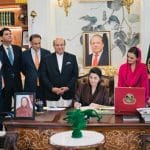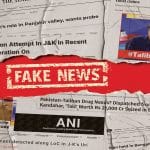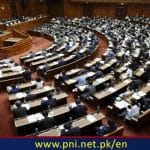- Christian community in eastern Pakistan was attacked by a mob of religious extremists on 16th of August, vandalizing several churches and setting fire to several homes while two of its members were accused of desecrating the Quran.
This unsettling incident took place in industrial district of Jaranwala, situated within Faisalabad—a city aptly called the “Manchester of Pakistan” for its industrial prowess. Authorities revealed that the Christians were accused based on writings found in the Holy Quran, with insulting words in red—an act that ignited outrage and fury.
In Pakistan, the punishment for blasphemy is dire: death hangs in the balance. Though no official executions have occurred, several accused individuals have fallen victim to the vengeance of enraged extremist mobs. Even more tragically, a former provincial governor and a minority minister lost their lives due to accusations of blasphemy.
However, the issue of blasphemy charges extends beyond mere legal consequences. Alarming reports indicate that such allegations are occasionally exploited as tools for personal vendettas. This manipulation of religious sentiment leads to a grim scenario where hundreds of individuals find themselves incarcerated, as judges, apprehensive of repercussions, are sometimes compelled to postpone proceedings out of fear of being perceived as lenient.
The chilling reality paints a bleak picture: the frequency and scale of these orchestrated, violent, and often uncontrollable attacks have escalated over recent years. The Human Rights Commission of Pakistan’s declaration underscores the gravity of the situation, highlighting the urgent need for comprehensive intervention.
The incident in Jaranwala is sadly familiar—extremist groups in Pakistan frequently seek excuses to harm vulnerable minorities. It’s essential to recognize that these individuals aren’t dedicated followers of Quranic teachings; their actions aren’t driven by sincere religious beliefs. Rather, they’re uneducated and manipulated by a handful of extremists, resulting in tragic outcomes. This pattern unfolded once again in Jaranwala Tehsil of Faisalabad.
What Unfolded at Jaranwala Christian Colony?
Trouble ignited when a massive crowd, numbering in the thousands, descended upon the Christian colony in Jaranwala. Their intent was to teach the two accused brothers a lesson. These siblings were alleged to have defiled the Quran, the holy book of Muslims. Armed with sticks, stones, and weapons, the mob wreaked havoc. The initial target was a church, which they set ablaze, followed by attacks on other nearby churches and the homes of local Christians.
The mob amplified their aggression through mosque loudspeakers, inciting violence and demanding the immediate arrest of the two brothers, supposedly responsible for the Quran insult. Their aim was to administer a collective punishment. The chaos persisted for hours, as confirmed by local media. By midday, at least eight churches lay vandalized, with their contents set ablaze. Local Christians believe the actual extent of church damage is even more substantial.
This incident exposes a grim reality: religious extremist groups exploit governmental weaknesses and ineffective law enforcement strategies to target minorities. While these groups aren’t endorsed by official institutions, they continue their assaults on minority communities. Even if government bodies don’t remain passive, their disciplinary efforts often fall short. Cases tend to fade away over time.
In response to the alarming attack on the minority places of worship in Jaranwala Tehsil of Faisalabad, Punjab’s caretaker government took action. Two individuals who played a role in inciting violence were apprehended by the police. Within the following 24 hours, the provincial government ordered a thorough investigation into the incident. Additionally, over a hundred individuals were arrested in connection to the violence, marking a step towards accountability and justice.
Preliminary Investigation Report
According to the initial report of the Jarranwala incident, a staggering 16 churches were set ablaze by an uncontrollable mob during the violent turmoil. Citing the alleged desecration of the Quran, protests ignited around 8:15 am, compelling the closure of business centers. Subsequent to mosque announcements, individuals from various cities and villages flocked to Jaranwala.
By 11 am, the unrest escalated as protesters targeted the Christian Colony, leaving a trail of vandalized houses and torched churches in their wake. Shockingly, even the assistant commissioner’s residence fell victim to arson. The report further discloses that within the local Christian population of Isanagari, 15 houses and three additional churches were set aflame. In response, police started laathi charge and tear gas to quell the chaotic scene.
Christian Families’ Shelter in the Fields:
Following the distressing incident, Christian families found themselves seeking refuge in fields and abandoned spaces, driven by the devastation of their homes and the onslaught of attacks. Some families even sought solace in the homes of their relatives residing in other areas, seeking safety amidst the chaos. As the situation in Jaranwala gradually stabilized, families cautiously began returning to their residences.
In response to the dire situation, the Punjab government swiftly formed an eight-member committee tasked with evaluating the extent of the damage inflicted by the incident. A commendable move, the provincial administration has also assured that compensation will be provided for the incurred losses, including damages to the homes of the Christian population and their belongings.
Within the context of Pakistan’s ever-growing population, which has now reached a staggering 241 million, it’s concerning that the actions of a mere few hundred extremists can exercise such control over the nation. These extremist groups wield the power to instigate attacks at will, bending state institutions to their violent will. The Asia Bibi case serves as a global testament to such influence, offering a grim perspective on the events of recent years. By delving into this backdrop, we can gain valuable insights into the current state of affairs, shedding light on how and why we have arrived at this point.
Asia Bibi: A Blasphemy Case that Shocked the Nation
In the discourse surrounding violence against religious minorities in Pakistan, the name of Asia Bibi invariably emerges. Her blasphemy case carried such gravity that it led to the tragic assassinations of a Federal Minister and a provincial Governor at the hands of extremists.
Asia Bibi’s journey began in Atanwali, a modest village in Punjab’s Sheikhupura district. As is often the case in many Pakistani cities, the local Christian community, including the impoverished Bibi family, found themselves relegated to low-status occupations like cleaning and sweeping. A devout Catholic, Asia worked as a farm laborer in Sheikhupura to support her family. Married to a bricklayer and a mother of two, she faced the challenges of daily life with unwavering determination.
In June 2009, while harvesting falsa fruit in a Sheikhupura field alongside fellow women farmhands, Bibi was asked to fetch water from a nearby well. Pausing to quench her thirst with an old metal cup left by the well, she unwittingly stirred a storm. A neighbor named Musrat witnessed this act and, driven by anger, informed the other women that it was forbidden for a Christian to share a vessel with a Muslim. The incident sparked outrage among the women, who deemed Bibi impure due to her Christian faith. Asked to convert to Islam, Bibi courageously declared, “I believe in my religion and in Jesus Christ, who accepted death on the cross to atone for the sins of mankind.”
Subsequently, a mob descended upon her home, subjecting her and her family members to a brutal assault. The local police intervened, launching an investigation into her words. Local police officer Muhammad Ilyas claimed that Bibi had uttered highly offensive words about the Quran and the Prophet of Islam, allegations that she eventually admitted to.
Five days later, local Muslim leader Qari Salim pressured individuals in the vicinity to accuse Bibi of blasphemy. When attempts to coerce a confession from her proved futile, Salim turned to the mosque’s loudspeakers, urging people to force her admission. Witnessing this, the neighborhood residents violently beat Bibi in front of her children. She was then detained for over a year before formal charges were brought against her.
Despite vehemently denying the blasphemy allegations, Bibi was handed a death sentence by Judge Muhammad Naveed Iqbal of Sheikhupura, Punjab, in November 2010. This shocking verdict marked her as the first woman in Pakistan to face execution for blasphemy.
Bibi’s husband, Ashiq Masih, publicly announced his intention to appeal the verdict, a move that was upheld by the Lahore High Court. A month later, the Governor of Punjab, Salman Taseer, responded to President Asif Ali Zardari’s directive to review the case. Taseer suggested that Bibi would receive a presidential pardon if the High Court didn’t suspend the sentence. However, the High Court issued an injunction against a potential presidential pardon, deepening the turmoil surrounding the case.
Challenging Norms: Taseer and Bhatti’s Assassinations
In 2011, Pakistan witnessed two tragic assassinations that left the nation reeling. On January 4th, Punjab Governor Salman Taseer met a grim fate in Islamabad. His own security team member, 26-year-old Malik Mumtaz Hussain Qadri, fired an official gun, ending Taseer’s life. This shocking act was a response to Taseer’s defense of Asia Bibi and his vocal opposition to the contentious blasphemy law.
Mumtaz Qadri’s fate was sealed when he received a death sentence for the murder, carried out on February 29, 2016. Governor Taseer’s bold stance against the law and his advocacy for Bibi’s cause made him a target, sending shockwaves through the nation.
The day after Taseer’s death, thousands defied the Taliban’s and certain clerics’ warnings to pay their respects at his funeral in Lahore. This unity showcased Pakistanis’ resilience, while a smaller faction within the nation hailed the murderer as a hero.
In a parallel incident, Shehbaz Bhatti, Minority Affairs Minister, faced danger. In June 2010, he received a chilling death threat, warning of beheading if he advocated for changes in blasphemy laws. Undeterred, Bhatti pledged to fight for justice and Asia Bibi’s release. On March 2nd, 2011, his unwavering stance cost him his life. Ambushed near his Islamabad residence, he was fatally shot, likely due to his steadfast position on blasphemy laws.
Bhatti’s death left a void, as the sole Christian cabinet member. These brutal killings served as stark reminders of the challenges faced by those championing human rights and justice in Pakistan.
Asia Bibi Declared Innocent, But Challenges Remain
After eight years of solitary confinement, Asia Bibi’s innocence was finally recognized on October 31, 2018. However, her acquittal sparked protests from certain religious groups. Muhammad Afzal Qadri, a prominent figure in the religious organization TLP, even went as far as expressing disturbing sentiments, hinting at violence against the judges who cleared her name. He chillingly remarked, “The Chief Justice and two other judges deserve to be killed…either their security guards, their drivers, or their cooks kill them.”
In November 2018, an agreement was brokered between the government led by Imran Khan and the Tehreek-e-Labaik (TLP), a religious political party. This agreement led to the endorsement of protests against Asia Bibi’s acquittal. Shockingly, the deal also prevented Asia Bibi from leaving the country. In a concession to the TLP, the government released detained TLP protesters.
Under mounting pressure from the TLP, the Pakistani authorities took an unprecedented step. They refrained from releasing Asia Bibi from custody until the Supreme Court conducted a final review of its decision. This delay in her release underscored the deep-seated challenges associated with advocating for justice and religious freedom in Pakistan.
Tragedy Strikes Sialkot: A Tale Echoing Asia Bibi’s Ordeal
Asia Bibi’s ordeal as a victim of extremism in Pakistan has garnered global attention. While she now enjoys a new life with her family outside Pakistan, another chilling tale unfolds in the city of Sialkot—a horrifying incident involving a Sri Lankan factory manager.
Sialkot, renowned for its football production for the World Cup, became the backdrop for a disturbing event where Sri Lankan national Priyantha Kumara Dayavadna fell victim to the same extremist elements. Kumara, a Buddhist who had resided in Pakistan for 11 years, not only lost his life to the extremists’ accusations of blasphemy but also faced the horrifying fate of his body being set on fire.
Kumara’s tragic fate was sealed by his own fellow factory workers, who accused him of blasphemy for removing a poster containing religious content. However, it later emerged that Kumara had merely removed the poster due to ongoing renovations in the factory building.
The court handed down death sentences to six individuals involved in Kumara’s brutal murder, while nine others received life imprisonment. Additionally, 72 individuals were sentenced to two years in prison—a grim reflection of the aftermath of this tragic incident.
Safeguarding Minorities: Ensuring Their Rights and Representation
The protection of minorities in Pakistan’s political framework is firmly enshrined in Article 36 of the Constitution of Pakistan, which guarantees comprehensive safeguards for their rights. Pakistan’s commitment to its minority population is evident as all minority groups in the country are proportionately represented in the National and Provincial Assemblies, as well as the Senate. This proportional representation is effectively extended to local bodies at the grassroots level.
Article 36 of the Constitution of Pakistan reads:
“The State shall safeguard the legitimate rights and interests of minorities, including their due representation in the Federal and Provincial services.”
Minorities: Integral Contributors to Pakistani Society
Minorities, including the Christian community, have played a commendable role in Pakistan’s political and social development. The judiciary of Pakistan boasts revered names like Justice Cornelius, Justice Darab Patel, and Justice Bhagwan Das, who have earned widespread respect for their contributions. The name of Joginder Nath Mandal along with the first Law Minister of Pakistan and Founder of Pakistan Muhammad Ali Jinnah is prominent in the freedom movement of Pakistan. Joginder Mandal also has the honor of presiding over the inaugural session of the first Constituent Assembly of Pakistan for which he was nominated by the founder of Pakistan himself.
Conclusion
Pakistan, with its massive population of 241 million, is largely inhabited by forward-thinking Muslims who embrace modernity. They don contemporary attire, enroll their children in English-speaking schools, and dream of sending them for higher education abroad. However, a small faction within this society allows their intense religious fervor to overshadow rationality, leaving the entire system seemingly helpless against their influence. Compounding this challenge is Pakistan’s weak judicial system, ranking among the world’s lowest performers.
Pakistan’s struggle with extremism often finds an ally in its flawed district administration. Unfortunately, this administration lacks the tools to rein in extremist groups and only seems to serve corrupt political leaders. Its primary function appears to be granting favors, leaving governance far from effective.
Adding to the complexity are Pakistan’s feeble political leaders, who prioritize their self-interest over curbing extremism. Rather than controlling these groups, they seek transient alliances, hoping to leverage the street power of religious extremists in upcoming elections. This approach inadvertently strengthens the groups they aim to manage.
Compounding these issues is Pakistan’s alarmingly low literacy rate, even in the 21st century. Impoverished families, struggling to feed their large families, turn to religious institutions offering sustenance and free religious education. Donations to these institutions come from individuals who, instead of addressing their business practices, seek redemption through charitable acts.
To cultivate religious tolerance in Pakistan, an extensive educational initiative must be launched, aimed at offering equal educational opportunities to every citizen. Otherwise, places of worship will remain vulnerable to attacks, and individuals will continue to suffer from acts of violence. The words of Pakistan’s founding father, Muhammad Ali Jinnah, echo with relevance:
“We are starting with the fundamental principle that we are all citizens and equal citizens of one state. No matter what is his color, caste or creed, is first, second and last a citizen of this state with equal rights, privileges and obligations… Pakistan will provide its minorities an ample field for the outlet of their genius and they should come forward and play their role as true citizens in making Pakistan one of the greatest nations.”
Follow the PNI Facebook page for the latest news and updates.








